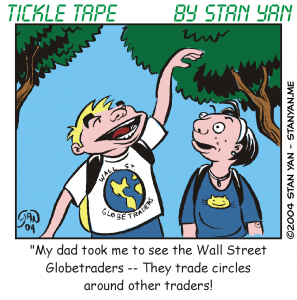Has a close friend ever confided in you about a losing trade? Perhaps he or she risked a little too much capital on a bad trade. Maybe he or she forgot to use a stop-loss, and then fruitlessly hoped against hope that the trade would miraculously turn around. At this point, denial usually sets in. Suddenly, your friend, panicked and dazed, describes how he or she is trying to hide the potential losses from his or her spouse.
But you see things differently. Your money isn’t on the line, and you see the futility of the whole situation. Somewhat incredulously, you can’t understand why your friend is not merely accepting the loss and moving on to new trading opportunities. Novice and seasoned traders alike can become stressed out as losses mount. And when fear sets in, it’s hard to think straight. There’s a point where you aren’t only losing your money, but also your objectivity. When you get to this point, it’s vital to get out of the emotional hole you’ve dug, regain your composure, and take a good, hard look at your options.
Holding on to losing trades is so ubiquitous that behavioural economists have given it a name. They call the ailment the disposition effect. There’s a natural human tendency to protect our assets, and an equally natural inclination to deny the trouble we are in when we’ve made a losing trade. If you’re like most people who enter the trading profession, you want to win. You hate being wrong, and you hate losing.
The need to be right, however, is a trader’s worst enemy. Traders sabotage themselves when they fail to admit their shortcomings and mistakes. Although it’s easier said than done, flexibility and open-mindedness is the hallmark of success for a trader. If you can be flexible enough to admit your mistakes, which result from your humanness and vulnerability, you’ll be able to take losses in stride. You’ll be able to stay objective and read the markets intuitively and precisely.
That said, controlling your emotions while your money is in play isn’t always easy. As you monitor your trade, you can’t help but think about what you could lose. But it’s vital to remember that you aren’t powerless over your emotions. There are a number of things you can do to restore control.
First, look at your assumptions about losses. Many novice traders strive for perfection in a field where losses and setbacks are commonplace. At every setback or loss, they think, “How could I have been so stupid, so incompetent?” This isn’t a very adaptive mindset while trading chaotic and volatile markets. You should go into trading expecting to make many more losses than wins. But that’s all right. You can end up profitable in the long run even when less than 50% of your trades are losers. Remembering this fact of trading can help you maintain your composure. Second, it’s vital to limit your risk and trade with money that you can afford to lose. If you know deep down that you can survive a loss, you will stay calm even during the midst of a losing trade.
Never underestimate the value of risk management. Finally, if circumstances are so overwhelming that you cannot think clearly, you might want to think about closing out a trade even when it’s going your way. These days, commissions are low enough that you can easily close out your positions, evaluate them, and contemplate your options. The relatively low commission costs are worth it when you consider the peace of mind it buys. You’ll find that once your money is no longer at risk, you’ll calm down and look at your trades more objectively.
Trading is indeed a stressful business. There’s pressure to do well, and the need to do well can interfere with your ability to cultivate the calm, winning mindset needed for financial success. But by staying optimistic and managing your risk, you can remain objective, free, and creative. And when you reach this state of being, you’ll increase your chances of mastering the markets.


